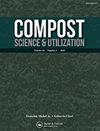Study of Total Bacteria and Ammonia-Oxidizing Bacteria and Ammonia-Oxidizing Archaea in Response to Irrigation with Sewage Sludge Compost Tea in Agricultural Soil
IF 0.9
4区 农林科学
Q3 ECOLOGY
引用次数: 5
Abstract
ABSTRACT Organic amendments have been shown to improve the quality of agricultural soils. Thus, the use of sewage sludge compost tea as a fertilizer can be considered a worthy and environmentally friendly alternative as it also offers the option of recycling sludge at the same time. However, an in-depth knowledge of how the addition of this product affects soil microbial diversity is still necessary. As such, the main objective of this study was to evaluate, at a microcosm level, the effects of irrigation with sewage sludge compost tea in an olive grove soil, focusing on the changes in the total bacteria, ammonia-oxidizing bacteria (AOB), and ammonia-oxidizing archaea (AOA). For this purpose plastic pots were filled with olive grove soil, watered with different amounts of water and/or compost tea, and incubated at 21 and 35°C for a period of 90 days. Denaturing gradient gel electrophoresis (DGGE) fingerprinting, real-time PCR, and 454-pyrosequencing analysis were performed. Our results suggested that the addition of sewage sludge compost tea (liquid fertilizer) slightly increased the soil biological diversity during the incubation time which suggests that sewage sludge compost tea did not have any negative effects in the soil microbiota. Accordingly and regardless of the incubation temperature, significant changes in the soil community structure were not observed throughout the experiment, suggesting that the treated soils maintained their microbiological stability.农业土壤中总细菌、氨氧化细菌和氨氧化古菌对污泥堆肥茶灌溉反应的研究
有机改良剂已被证明可以改善农业土壤的质量。因此,使用污水污泥堆肥茶作为肥料可以被认为是一个有价值的和环保的替代品,因为它同时也提供了回收污泥的选择。然而,深入了解该产品的添加如何影响土壤微生物多样性仍然是必要的。因此,本研究的主要目的是在微观水平上评价污水污泥堆肥茶灌溉在橄榄园土壤中的效果,重点关注总细菌、氨氧化细菌(AOB)和氨氧化古细菌(AOA)的变化。为此,在塑料罐中装满橄榄园土壤,用不同量的水和/或堆肥茶浇灌,并在21和35°C下孵育90天。变性梯度凝胶电泳(DGGE)指纹图谱、实时PCR和454焦磷酸测序分析。结果表明,污泥堆肥茶(液肥)的添加在孵育期间对土壤生物多样性略有增加,表明污泥堆肥茶对土壤微生物群没有任何负面影响。因此,无论孵育温度如何,在整个实验过程中都没有观察到土壤群落结构的显著变化,这表明处理过的土壤保持了微生物稳定性。
本文章由计算机程序翻译,如有差异,请以英文原文为准。
求助全文
约1分钟内获得全文
求助全文
来源期刊

Compost Science & Utilization
农林科学-生态学
CiteScore
4.10
自引率
0.00%
发文量
0
审稿时长
>36 weeks
期刊介绍:
4 issues per year
Compost Science & Utilization is currently abstracted/indexed in: CABI Agriculture & Environment Abstracts, CSA Biotechnology and Environmental Engineering Abstracts, EBSCOhost Abstracts, Elsevier Compendex and GEOBASE Abstracts, PubMed, ProQuest Science Abstracts, and Thomson Reuters Biological Abstracts and Science Citation Index
 求助内容:
求助内容: 应助结果提醒方式:
应助结果提醒方式:


